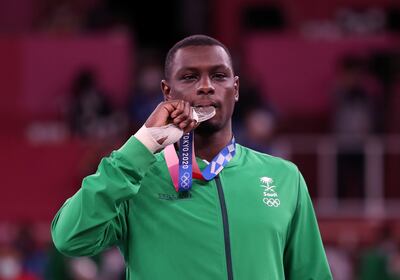Feryal Abdelaziz became the first Egyptian woman to win Olympic gold when she topped the podium in karate in the women’s kumite +61kg class. Abdelaziz’s win was historic for Egypt on what was a dramatic and controversial final evening of karate.
Abdelaziz’s final against Azerbaijan's Iryna Zaretska got off to a nervy start, with neither athlete willing to give anything away or lose the Senshu (first score advantage) by counter-attack. Both karatekas picked up penalties for failing to engage.
Then with a minute to go, the action finally began. The finalists grappled but failed to land any blows until Abdelaziz cleanly connected a hook kick. She was awarded the Yuko, first point and the vital Senshu.
With the seconds slipping away, her opponent Zaretska threw a flurry of punches and kicks, well-defended by the Egyptian who was unbeaten throughout her qualifying elimination pool matches. With just 25 seconds to go, Abdelaziz connected again, attacking with a long reverse punch, picking up the second Yuko and doubling her lead.
Again the Azerbaijani came back with a series of kicks, reverse kicks and a takedown but to no avail.
The clock ran down to zero and victory was awarded to the Cairene, who knelt to the floor and roared to the sky, exalted and relieved.
With her victory, the 22-year-old made history as the first ever female Egyptian Olympic champion, and the first athlete to bring gold back to Egypt since 2004.
“I hope people will change their mind, and karate will be included in the next Olympic Games,” Abdelaziz said.
“There are millions of people around the world who practice karate, and I think it really deserves to be included. We’ve shown these at Games how beautiful it is, and we’ve demonstrated the strength of our competition. I think we deserve a future in the Olympics.”

After Abdelaziz’s convincing win, the night’s karate finals came to a dramatic end as Saudi Arabia’s Tareq Hamdi agonisingly missed out on a gold medal in the men’s kumite +75kg final. His opponent - Sajad Ganjzadeh - was awarded the win after Hamdi was adjudged to have broken kicking rules.
Instead of celebrating victory, Hamdi was left heartbroken. However, he gracefully accepted the verdict.
“If you ask me if I agree or not, I disagree, of course, because I love the gold medal,” Hamdi said. “But I am satisfied with the level of performance I gave, and I accept their decision. I don’t have any objection. I think I played well. That’s all I can say.”
Hamdi’s silver medal still was only the second ever won by Saudi Arabia. He joined the celebrations at the podium and did not show disappointment in a fine display of sportsman's spirit.
There were no such concerns for Egypt. Abdelaziz's medal came just 24 hours after her compatriot, Giana Lotfy, won bronze in the kumite -61kg competition, having narrowly missed out a place in the final after the judges awarded the win to her opponent on form (Hantei).
Egypt’s only silver medal of the games was also awarded on Saturday, to Ahmed Elgendy in the modern pentathlon, who finished just five points off Britain’s Joseph Chooing. Egypt’s total of six medals is the country’s biggest haul at the Olympics.
The one gold, one silver and four bronze at the Tokyo Games beats their previous best tally of five which they have achieved on three occasions.
Elsewhere, Bahrain’s Kalkidan Gezahegne took silver in the women’s 10,000m final. She was runner-up to Sifan Hassan of the Netherlands, who added the win to the 5,000m and 1,500m bronze in an unprecedented medal haul in middle and long-distance Olympic history.
In the final athletics event of the Tokyo Games on Sunday, a number of regional athletes will be competing in the men's marathon, including Bahrain's El Hassan El Abbassi, Shumi Dechasa, and Alemu Bekele, and Moroccans Othmane El Goumri, Mohamed Reda El Aaraby, and Hamza Sahli.

